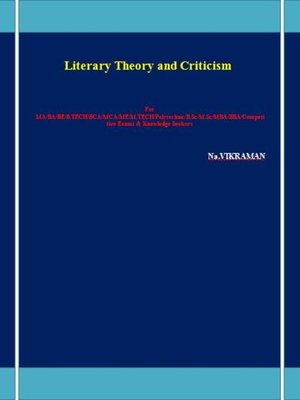Literary Theory and Criticism
ebook ∣ For MA/BA/BE/B.TECH/BCA/MCA/ME/M.TECH/Polytechnic/B.Sc/M.Sc/MBA/BBA/Competitive Exams & Knowledge Seekers · MABABSCMSCMCABCALITT
By NA.VIKRAMAN

Sign up to save your library
With an OverDrive account, you can save your favorite libraries for at-a-glance information about availability. Find out more about OverDrive accounts.
Find this title in Libby, the library reading app by OverDrive.



Search for a digital library with this title
Title found at these libraries:
| Library Name | Distance |
|---|---|
| Loading... |
Criticism is an overall term for studies concerning with defining, analyzing, interpreting and evaluating works of literature. Theoretical criticism speaks of literary theory. Some such theoretical critics have been Aristotle, Longinus, Horace, Sainte-Beuve, Johnson, Coleridge, Arnold, Poe, Emerson, Richards, Burke and Frye. "Literary criticism" refers to the act of interpreting and studying literature. A literary critic is not someone who merely evaluates the worth or quality of a piece of literature but, rather, is someone who argues on behalf of an interpretation or understanding of the particular meaning(s) of literary texts. The task of a literary critic is to explain and attempt to reach a critical understanding of what literary texts mean in terms of their aesthetic, as well as social, political, and cultural statements and suggestions. A literary critic does more than simply discuss or evaluate the importance of a literary text; rather, a literary critic seeks to reach a logical and reasonable understanding of not only what a text's author intends for it to mean but, also, what different cultures and ideologies render it capable of meaning.
"Literary theory," however, refers to a particular form of literary criticism in which particular academic, scientific, or philosophical approaches are followed in a systematic
fashion while analyzing literary texts. For example, a psychoanalytic theorist might examine and interpret a literary text strictly through the theoretical lens of psychoanalysis and psychology and, in turn, offer an interpretation or reading of a text that focuses entirely on the psychological dimensions of it. Traditional literary criticism tends not to focus on a particular aspect of (or approach to) a literary text in quite the same manner that literary theory usually does. Literary theory proposes particular, systematic approaches to literary texts that impose a particular line of intellectual reasoning to it.
ARISTOTLE
Aristotle lived from 384 B.C. to 322 B.C. He was the most distinguished disciple of
Plato. Among his critical treatise, only two are extant- 'Poetics' and 'Rhetoric', the former deals with the art of poetry and the latter with the art of speaking. Aristotle sees that epic poetry, tragedy, comedy, dithyrambic poetry, and music are alike in that they all imitate.
They differ in the medium, objects, and manner of imitation.
THE PLAN OF POETICS
Poetics contains twenty six small chapters. The first four chapters and the twenty fifth are devoted to poetry; the fifth in general way to comedy, epic, and tragedy; the following fourteen exclusively to tragedy; the next three to poetic diction; the next to epic poetry; and the last to a comparison of epic poetry and tragedy. Aristotle's main concern thus appears to be tragedy, which was considered the most developed form of poetry in his day. Poetry, comedy, and epic come in for consideration because a discussion of tragedy would be incomplete without some reference to its parent and sister forms............
This book has been written for the Medical/Pharmacy/Nursing/ME/M.TECH/BE/B.Tech students of All University with latest syllabus for ECE, EEE, CSE, IT, Mechanical, Bio Medical, Bio Tech, BCA, MCA and All B.Sc Department Students.
The basic aim of this book is to provide a basic knowledge in Literary Theory and Criticism.
Literary Theory and Criticism Syllabus students of degree, diploma & AMIE courses and a useful reference for these preparing for competitive examinations.
All the concepts are explained in a simple, clear and complete manner to achieve progressive...







